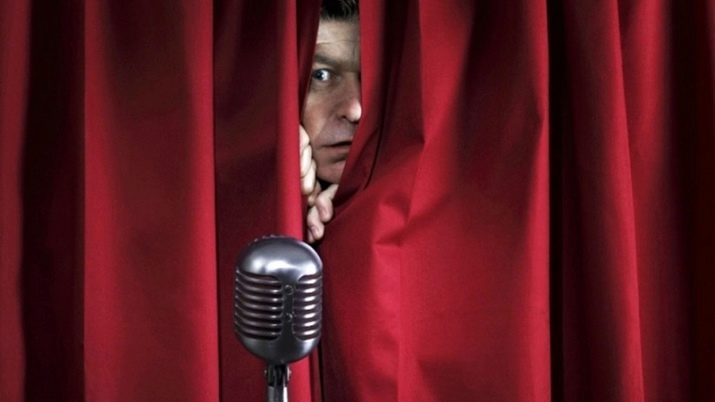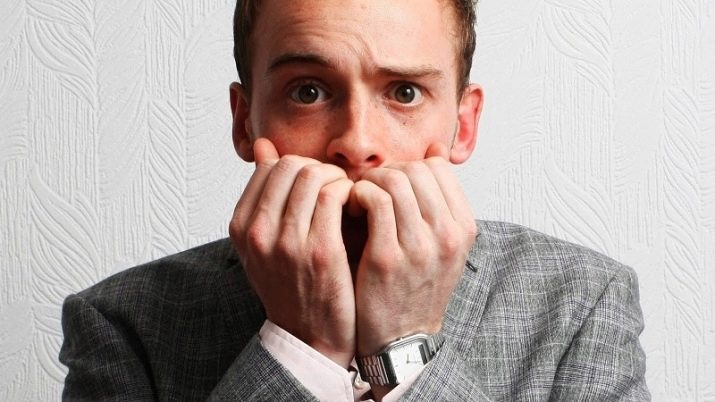Glossophobia: description, causes and methods of struggle

Stage fright is one of the most common phobias that affects children and adults of any gender or social status. The reasons for the anxiety, anxiety and panic associated with public speaking are varied and largely individual.
Currently, this phobia is very successfully treatable with the help of qualified psychologists or psychotherapists.

What it is?
Stage fright in psychology is called glossophobia. This name comes from the Greek language, where "glosso" means "speech". Phobia for various reasons appears in people, delivering quite unpleasant and serious experiences, because for many of us life is directly related to public speaking. We have to perform a lot in everyday life - at work or at family celebrations.
In many professions and other areas of activity, individuals have to accept in one way or another the need to deliver a speech to the general public, as well as communicate with the audience. For example, it could be work in political structures, pedagogy, work as a lawyer, management, acting. All these professions require confident self-control in public, moreover, the skills of attunement to the audience, the ability to convince people that they are right, inspire them with the right mood and convey their message clearly and attractively are important.
Each person in his life in some way faced a situation in which he had to go on stage, show his oratorical skills, present something to a large number of strangers or even skeptical people.Various psychological studies and surveys demonstrate that the vast majority of all people in the world experience fear when it comes to speaking in front of a wide audience.
And very often we are not talking about normal light excitement, but about a real phobia, which significantly spoils the patient's quality of life. After all, a phobic disorder not only causes severe stress in any individual suffering from it, but also becomes the cause of physiological malaise and even illness.

Many individuals with this phobic disorder want to understand how to confront and conquer stage fright. Glossophobia provokes a huge decrease in the quality of life in such people. The disease significantly interferes with promotion at work and all career activities in general. To accomplish many professional tasks, it is important to be able to convince the audience.
Thus, obsessive and uncontrollable stage fright is a very unpleasant and complex serious disorder, to which many individuals attach by no means the last meaning. This can especially apply to those who, by the nature of their own activities, are simply forced to speak publicly in front of a large number of people every day. If such people trigger this phobia, do not try to overcome their fear on their own, and also refuse qualified help from a psychologist or psychotherapist, the results can be sad. Stress in this case can lead to mental pathologies, the development of chronic diseases, constant malaise, alcohol or drug addiction.
Some individuals try to overcome their stage fright on their own.by creating for yourself certain techniques and behaviors that help you calm down. Some take mild sedatives or, on the contrary, strong antidepressants and sedatives. Sometimes it comes to drugs and alcoholic beverages in large quantities. However, this is not a solution to the problem, but ignoring it - this can help only for a short time.
It is not uncommon in psychological practice and severe cases when a phobic disorder became the cause and fertile ground for the development of schizophrenia in a phobic patient, as well as any kind of personality disorder, psychopathy.

Varieties of phobia
Experts identify different types of glossophobia. The fact is that the problem is very complex and complex and the reasons for its occurrence, as well as psychological manifestations, can differ significantly. After the psychologist identifies all the details of stage fright and public speaking, he will be able to choose the fastest and most effective way of treatment for the patient. This phobia can be divided into three types.
- Peyraphobia (fear of the public) consists in the fear of speaking in a large crowd of people. A person does not have any problems to make a presentation in a circle of two or three people, but a wide audience, a full hall of people cause panic horror. This disorder can often be associated with social phobia and anthropophobia, as well as fear and discomfort at any kind of public events.
- Verbophobia (fear of speaking) Is the fear of speaking. In this case, unpleasant symptoms of phobia arise even when the audience is very small. It is difficult for the patient to tell a long story in the company of his friends, let alone make presentations in front of a full hall of people.
- Lalophobia (fear of stuttering or impaired diction) lies in the fact that a person is afraid to make a slip of the tongue, start stuttering or not be able to pronounce the words. It is interesting that phobia occurs both in people who really suffer from all kinds of diction disorders, stuttering or dyslexia, and in people who do not have any serious problems or abnormalities with articulation.
Sometimes a person has only one kind of stage fright, and sometimes they act in combination. It is very important to correctly determine what exactly a person is afraid of. After that, you can understand the symptoms of the phobic disorder, relieve symptoms and deal with the treatment of the disease.

Why does fear arise?
The reasons for glossophobia may differ in each specific case: the study of this phobia shows that, for example, in schoolchildren, fear may arise from the fear of being ridiculed, and among top managers, from fears it is not enough to convincingly convey their idea. And there can be countless such variants of reasons. Professional psychologists identify two main and leading factors that can influence the development of stage fright. They highlight heredity and upbringing, that is, innate character traits and personality traits or acquired fears through specific social influences.
In this case, according to psychologists, heredity means an initial tendency to experience any emotions too vividly, impressionability, as well as a genetically inherited fear of society. It is worth noting that the type of temperament, features of a person's character traits, the degree of strength of the emotions experienced by this person are also inherited. Parents and their daughters and sons are often very similar to each other in their psychological characteristics: researchers often record the same phobic disorders in them, not to mention the fact that there is definitely a similar emotional perception.
Experienced psychologists and psychotherapists often equally believe that it is social prerequisites that can provoke the presence of stage fear in a person and the further development of glossophobia to the greatest extent.

Among such prerequisites, the following are distinguished:
- overly authoritarian parenting in childhood;
- conflicts and aggression in the family or in other immediate environment of the child can also have an extremely negative impact and increase the risk of a phobic disorder;
- an emphasis in education on outside criticism, attempts to constantly compare the child with others;
- excessive self-criticism and reflection, the desire to be convenient for everyone and to please everyone, the tendency to trust any authority;
- low self-esteem, insufficient self-love;
- a great failure in childhood, which others have discussed and criticized for a long time - this is a kind of trauma that can become a starting point for a phobia;
- the tendency to be pessimistic about the world and negatively interpret any facts.
Another possible and common prerequisite for the development of such a phobia can be poor preparation for the presentation, lack of competence, lack of confidence in their knowledge, inability to answer questions outside the scope of the report. In addition, sometimes the phobia is simply due to a lack of practice. Often, the more a person speaks in front of an audience, the more confident he is, and vice versa - if this is the first serious performance in life, the phobia can manifest itself in various unpleasant symptoms.
Excessive perfectionism in an individual, the desire to be the best, to completely control the situation - these are also frequent prerequisites for the development of many phobias, in particular, panic anxiety before public speaking.
For such individuals, the opinion of the public about themselves will be unnecessarily important. However, public opinion is fickle, unstable and depends on many factors: even good speakers are not always met with enthusiasm by people, so anxiety is inevitable.

Symptoms
Panic about public speaking can be expressed in many ways. Glossophobia provokes not only negative emotional experiences in a person, it should be borne in mind that it often also manifests itself at the physiological level.The manifestations of certain symptoms are very variable and individual: in some cases, a person can tolerate a phobia relatively easily, and often it really interferes with life.
It all depends on the causes of the phobia, the person's temperament and the stage of development of the disease. In the presence of protracted, advanced and severe forms of phobia, such a disease can even become a breeding ground for serious somatic disorders, interruptions in the work of internal organs.
Experts note that most often phobia is characterized by the following symptoms:
- the patient's nervous gestures are very common: it is simply difficult for a person in a state of panic fear to control his body;
- often speaking in the presence of a phobia is accompanied by an upset of the gastrointestinal tract, for example, many are faced with diarrhea;
- among the symptoms, many notice a nervous laugh for no apparent reason;
- excessive sweating is another reaction of the body, characteristic of strong fear, in particular, for the phobia of stage performances;
- many report dry mouth, dizziness, fever, and nausea, which can sometimes be accompanied by vomiting;
- trembling in the patient's voice, unnatural constrained facial expressions, muscle tension can also indicate the presence of an obsessive phobic disorder;
- accelerated heartbeat and increased blood pressure are symptoms that indicate that a person is in a state of stress;
- a feeling of a lump in the throat, and in rare cases, a complete loss of voice are also related to glossophobia;
- some note a change in the timbre of the voice, a violation of diction and articulation;
- sometimes patients are faced with involuntary urination;
- another characteristic symptom is numbness of the arms and legs, muscle cramps.


Treatment methods
You can overcome a phobia in its earliest stages on your own. To do this, you need to have willpower, as well as enlist the support of friends and family. To overcome fear, psychologists recommend that you take some measures.
- Yoga, meditation and breathing exercises Are useful remedies to get rid of the problem of excessive excitement. You must learn to relax, calm down, and relieve stress. In a public speaking situation, also try to breathe deeply.
- Light natural sedatives can be taken, for example, herbal teas. They can help calm anxiety, tune in to a positive mood, and defeat fear.
- Any means of relaxation can help - massage, hot bath, pleasant outdoor recreation. Make sure to take some time for yourself. Also try to sleep more, eat healthier foods, and exercise.
- Rehearsals for performances in front of the mirrorCareful preparation, including facial expressions and gestures, can give you confidence. Ask your loved ones to listen to your talk several times before the event to hone everything down to the smallest detail. This will contribute to your success in public, and the more often you perform successfully, the sooner you will feel confident and free.
- You can attend a training in public speaking: on it you can hone your public speaking skills, gain self-confidence and get rid of a phobia.
Modern psychology and psychotherapy will help get rid of a phobia at any stage. If fear prevents you from living, the ways to overcome it may be different, but the fastest is to seek professional help.
Psychologist's advice will help to understand the essence of the problem and get rid of obsessive anxiety. In difficult cases, medications are prescribed, but pills are usually not required.










